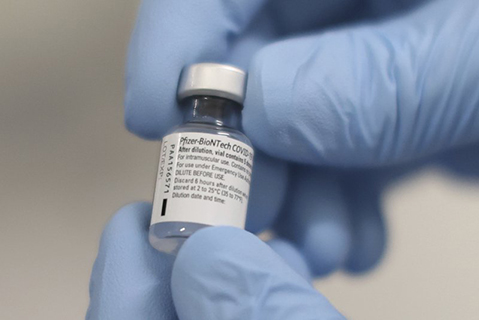University of Iowa Health Care officials said Wednesday (12/9) that the group’s hospitals expect to get their first shipment of a coronavirus vaccine as early as next week and that they plan to begin giving it to employees who work in COVID-19 units within 24 hours of receiving it.
Suresh Gunasekaran, the CEO of the University of Iowa Hospitals and Clinics, said he expects the UIHC subsidiary to get 1,000 doses next week. The hospital plans to give its first doses to some of the roughly 2,000 doctors, nurses and others who work in COVID-19 units. He said he expects to learn on a week-by-week basis how many doses the hospital will receive, so it’s unclear when the first group to receive doses will get a second and be fully vaccinated.
Iowa expects to receive 172,000 doses of vaccines produced by Pfizer and Moderna over the next month, assuming both companies’ products receive emergency use authorization from the Food and Drug Administration, Gov. Kim Reynolds said last week.
Essential health care workers and residents and workers in long-term care facilities will be the first to be vaccinated, the state said.
Gunasekaran said UIHC has installed super-cold refrigerators to store the Pfizer vaccine, which must be kept at minus-94 degrees. He said his hospital could store up to 50,000 doses if needed.
The vaccine can’t arrive soon enough. On Wednesday, Iowa reported another 123 COVID-19 deaths, pushing the state’s death toll to 3,021.
Hospitalization rates were significantly lower Wednesday than they were a week ago, but they were still high, with 900 people hospitalized with the disease, including 111 who were admitted in in the past day.
The Iowa Department of Public Health is transitioning to a new method of counting deaths that has the potential to add several hundred more cases to the state’s total in the coming weeks.
Public health data showed that the virus’ spread may be slowing from it’s highest point in mid-November, as the daily number of positive cases has decreased since Nov. 17. The state still had a high number of nursing homes with outbreaks as of Wednesday — 141.
Over the past two weeks, the rolling average number of new daily cases has decreased by about 39%, according to researchers at Johns Hopkins University.
Reynolds said at a news conference Wednesday that she would use federal coronavirus aid funds to provide a 30-day supply of masks, gowns and gloves to all of the state’s 432 long-term care facilities with distribution beginning next week. More than 1,100 of the state’s deaths occurred in a long-term care facility.
The governor said the state was also using the funds to bring in more than 100 temporary nurses to help fill a shortage at hospitals and 200 additional people will be put to work as contact tracers to help determine where virus spread is occurring.
Reynolds, who has taken a hands-off approach to the coronavirus for much of the pandemic, also left in place the health care emergency proclamation enacted last month that requires anyone age 2 or older to wear masks while indoors in public under certain circumstances. It also limits gatherings for social, community, business and leisure purposes to no more than 15 people indoors and 30 outdoors, saying the restriction applies to family events.
Bars and restaurants still cannot provide in-person service past 10 p.m. and Reynolds added other venues that serve alcohol including casinos to that restriction.




